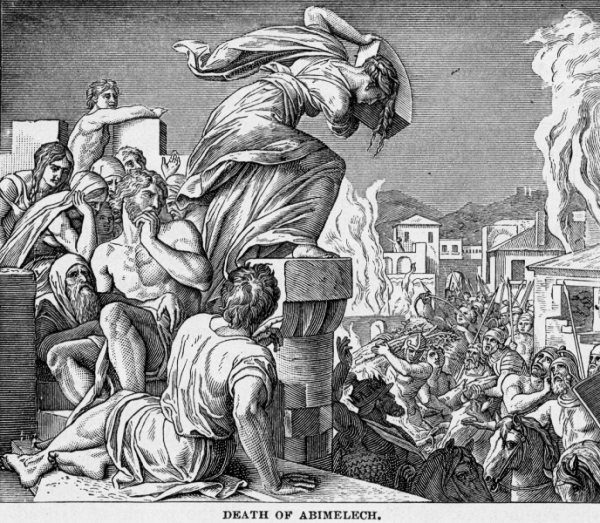Abimelech (Hebrew: אֲבִימֶ֫לֶך, also known as Abimelek), one of Gideon’s sons, served as a judge of Israel after Gideon. He Judged Israel for three years (B.C. 1322-1319), and was succeeded by Tola.
His name can best be interpreted as “my father is king”, claiming the inherited right to rule. He is introduced in Judges 8:31 as the son of Gideon and his Shechemite concubine, and the biblical account of his reign is described in Judges 9.
Abimelech was a son of Gideon by a concubine wife, a native of Shechem (Judges 8:30–31), where her family had considerable influence ( Judges 9:1-57). Through that influence Abimelech was proclaimed king after the death of his father, who had himself refused that honor when tendered to him, both for himself and his children ( Judges 8:22-24).
The killing of seventy brothers
Abimelech went to Shechem to meet with his uncles and grandfather of his mother’s side, and claimed to them that he should be the sole ruler over them and Shechem and not his brothers. He asked them whether they’d prefer to be ruled by seventy rulers or just by the individual, and he affirmed them as equal brothers. Because of Abimelech’s affirmation to them, the men inclined to follow him, and gave him seventy silver shekels from the Temple of Baal Berith. He and the men then traveled to Ophrah for Gideon’s home to kill Gideon’s seventy sons, Abimelech’s brothers; they were killed on the same stone, but only one had escaped, Jotham. (Judges 9:1-5)
Abimelech declared king
Since Abimelech was merely a son of Gideon’s concubine (Judges 8:30–31), he made good of his claim to rule over Manasseh by killing his half-brothers. Jotham was the youngest brother and the only one to have escaped Abimelech’s onslaught (Judges 9:5). Abimelech was later proclaimed king by the citizens of Beth-millo and Shechem (Judges 9:6).
When Jotham was informed of this news, he went on top of Mount Gerizim and cursed the people of Shechem and Beth-millo for their proclamation, then fled to Beer to hide from Abimelech. (Judges 9:7-21)
Battles of Shechem
First Battle of Shechem
Gaal and his brothers arrive at Shechem only to plot a coup against Abimelech with the help of the men of Shechem. Before Gaal could begin his plot, Zebul – who is the governor of Shechem and an officer of Abimelech – heard Gaal’s plan and was deeply angered. Zebul then sent messengers to inform Abimelech of Gaal’s plot. Abimelech planned to ambush Gaal and his followers in front of the city gates through the night towards the morning. He divides his followers by four companies to hide and wait near Shechem. The ambush begins as soon as Gaal stands in front of the gates and fails to respond because of the uncertainty of an actual ambush approaching. Zebul taunts Gaal into fighting Abimelech. Gaal soon fights Abimelech during the battle but fails and is forced to flee with his forces. Zebul chases Gaal out of Shechem while Abimelech proceeded to Arumah. (Judges 9:22-41)
Second Battle of Shechem
The next day the people of Shechem went out into the fields. After Gaal was driven away, Abimelech gathered three companies by dividing his followers to attack the people in the fields for turning against him and siding with Ga’al. One company went to the gate and the other two attack the people in the fields. Then, Abimelech went into the city and killed the rest and spread salt around so nothing would grow there for a long time. The remaining resistance went to the tower of El-Berith to hold their ground. Abimelech hastily gathered his followers to Mount Zalmon to explain his plan. He grabbed an ax to cut down the bough of a tree and ordered everyone to follow his example. The boughs were placed and set ablaze around the tower, killing the remaining resistance along with a thousand civilians. (Judges 9:42-49)
Battle of Thebaz and the death of Abimelech

The battle of Thebaz begins in the middle of the siege. Already, Abimelech has taken most of the city and comes upon a heavily fortified tower. The civilians head towards the top of a tower while he fights his way through. Abimelech successfully fights most of the way towards the tower, however, a woman struck his head with a stone above. Realizing the wound was mortal, he ordered his armor-bearer to thrust him through with his sword, so nobody would know he was killed by a woman. (Judges 9:50-57)
Abimelech offers a negative example of how a leader is to influence others. He led by force, murdered his opposition, and led in such a manner that even his subjects sought to overtake him. In contrast to the positive leadership of his father, Abimelech focused on his own personal gain, hurting many in the process.
Interestingly, a reference to Abimelech’s death would be made many years later during the reign of David. When Uriah was put on the front line of battle so he would die, Joab sent David a message that said, “Who killed Abimelek son of Jerub-Besheth? Didn’t a woman drop an upper millstone on him from the wall, so that he died in Thebez?” (2 Samuel 11:21). This reference held both a practical and spiritual message for David. Practically speaking, the reference noted that Abimelech served as an example of not getting too close to a wall during a battle. Spiritually, the reference pointed out the flaw of leading for one’s own gain rather than out of service to God.